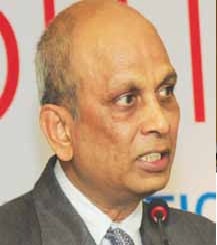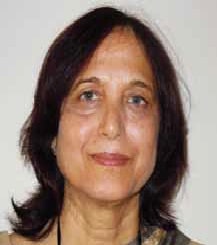For a country of our size, it is difficult to implement all the technology solutions at one go in all the schools. So it has to be done in a graded manner
 Subhash C Khuntia, Joint Secretary, Department of School Education & Literacy, Ministry of HRD, , Government of India
Subhash C Khuntia, Joint Secretary, Department of School Education & Literacy, Ministry of HRD, , Government of India
The 11th Five Year Plan focuses on education in a big way. What are the key milestones that the government is
looking at as far as school education is concerned in the coming year?
Since a large part of India’s population constitutes the youth, education occupies a prime position in the 11thFive Year Plan. If you see the Plan al education gets highpriority here. With Sarva Shiksha Abhiyann being a great success, large number of students will soon be knocking at the doors of secondary education and thatis why we are planning to ensure that these children get adequate access to seconllocation, more than 19% of the total outlay is devoted to education, whereasit was 9.5% in the 10th Plan. And again schoodary education. Similarly those who complete secondary education should be able to move to higher education. Right now the enrollment ratio in higher education is 11%, and the Ministry has plans to increase it to 15% during the Plan period. This can only be achieved if elementary as well as secondary education is given the pre-eminence. We have also set some ambitious targets like increasing the gross enrollment ratio in secondary education (9th and 10th) from 53% to 75% in the next five years. Another target is to reduce the gender gap in enrollment and also to reduce the gap in enrollment for weaker sections of society.
Prime inister Manmohan Singh has made an announcement about ‘model schools’. Can you laborate on it?
The ‘model school’ scheme involves setting up of one model school in every block in the country. It will comprise of 3500 government schools and 2500 schools through Public Private Partnership. The model school would basically serve as a demonstration unitand as a focal point to network with other schools in the block to build up a synergy to enhance the quality of education in all secondary schools. The much needed educational technologyand connectivity would be available in these model schools so that an ideal environment is created for teaching and learning.
In the new scheme where there is a talk of upgradation and maintenance of old and new schools, how is the role of ICT envisaged?
Of course, for the new schools we would like to have Information and Communication echnologies incorporated right into the structure of schools so that the paradigm of teaching
and learning can be different, making the process enjoyable for the children. The old schools would require upgradation as far as technology is concerned. There is a centrally sponsored scheme called ‘ICT at Schools’ through which every secondary or higher secondary school will be facilitated with ICT infrastructure and connectivity. The idea is to have effective ICT integration in all secondary schools by the end of the 11th Five Year Plan.
There is a huge disparity in quality as well as IT integration in schools maintained by the Central government and those of states. How does the Centre plan to reduce this disparity?
The ‘ICT at Schools’ scheme seeks to remove such disparity. Through the scheme we plan to equip each and every school with the required ICT infrastructure. This will hopefully start
a kind of chain reaction. The states can further reinforce this infrastructure as per requirements. Schools maintained by the Central government, like Kendriya Vidyalayas and Navodaya Vidyalayas, have been successful in IT integration as well as in provision of other resources. State governments having larger number of schools need to emulate them. Needless to say, all schools should maintain a minimum standard in all aspects including ICT.
Pro-Active Role Required For Facilitating Reforms In Education
 “Among the many limitations and bottlenecks which India faces is the attitudinal factor, where there is a built in resistance to use technology”
“Among the many limitations and bottlenecks which India faces is the attitudinal factor, where there is a built in resistance to use technology”
Shakila Shamsu, Joint Advisor (Education), Planning Commission
What objectives have been laid down in the 11th FiveYear Plan for catering to quality education in India?
The 11th Plan is an investment plan for Education and Health sectors. The education sector covering elementary,
secondary, higher and technical education will greatly benefit from the thrust given in the current Plan period. The problems affecting quality of education – such as inadequate infrastructure, poor quality of faculty, outmoded teaching methods, outdated curriculum, lack of linkages between knowledge and skills – have been taken cognizance and appropriate corrective steps have been suggested. The Plan includes a coherent ICT based education both at the secondary and higher education. All these can be achieved only if the States adopt a pro-active role in facilitating these reforms. States will have to protect the interests of the marginalised sections of the society through appropriate strategies as educational loans, scholarships, hostel facilities and other material assistance.
What role do you foresee for ICT in education? According to you, what are the reasons for India still lagging behind in ICT integration?
The buzzword today is ICT in education. But we need to assess the needs, usage and benefits of ICT in achieving educational objectives in a more realistic manner. Given my experience in Distance Education and Open Learning, ICT can produce optimal results only if both the receiver and sender are trained for its proper usage and attuned towards a common goal. Among the many limitations and bottlenecks which India faces is the attitudinal factor, where there is a built in resistance to use technology. There is also a bias that greater use of technology will increase the existing digital divide. Another danger is of top down approach which results in adopting technologies unsuitable for our national or regional needs. Appropriateness of technology is crucial to the success of ICT applications.
In your opinion, how can we create an enabling environment for effective and efficient use of technologies in schools? There is a general acceptance of the need to create technology enabled schooling environment. IT enabled learning would perhaps provide new directions in pedagogy and affect students achievement level. Technology seems to be the nswer to several problems in educational settings, provided basic infrastructure such as computers and computer labs, multimedia labs, internet connectivity, power backup, etc, are ensured. In addition, human capital in the form of trained teachers competent to use ICT is also required.
What role does public private partnership play in enhancing technology usage in school education?
I strongly believe that there is great need to nurture public private partnerships for implementing ICT in school education. Majority of schools in our country are not equipped to effectively integrate ICTs in their activities. Private enterprise can do a great deal not only by supplying hardware and maintenance, but also help in developing content for teaching various subjects, especially in regional languages. Another area where private sector initiatives can contribute is teacher training by developing proper training modules.
Lastly, what would be your message for stakeholders in the education sector regarding an ICT policy on education in India?
Each one of us directly or indirectly is a stake holder in the education sector. Students, teachers, parents, educational administrators, heads of educational institutions, technology providers, all have a stake in education. The greatest stumbling block in the way of implementing an ICT policy in education is the attitudinal bias which is technology resistant. We need to correct our perspectives and ensure a blended and balanced use of technology along with the human capital to extend the frontiers of education in a global setting.











 Asocial network signifies the relationships and affiliations among individuals, especially relating to their families, works, interests or hobbies. The evolution of Web-enabled social media has broadened its horizon, and the network now also includes fans and followers of celebrities, institutions, leaders and politicians. Social media started with users opening up accounts primarily for reaching out to friends and families and sharing with them ideas, images and videos. n fact, the popular social networking site Facebook was started in 2004 by Mark Zuckerberg, then a Harvard student, for rating students in terms of how handsome or beautiful they were. Social networking has got phenomenal acceptance among people across continents. Facebook, now, has more than 500 million users across the globe. After getting started in July 2006, Twitter has more than 190 million users in 2010. While being used for networking by teens and college goers, social media has emerged as a strong platform for branding and marketing for businesses. It is also being capitalised by government bodies and institutions, investigative and counter terrorism agencies, healthcare organisations, scientific and research and development communities, and political leaderships. Social media has provided a significant platform for businesses to connect with their stakeholders, channel partners, suppliers, and customers. A McKinsey report notes that advocacy leads to better sales. Given the way di cussions are done through postings on walls, comments and live chats, social media has offered a powerful branding tool in the hands of businesses. Gradually, search engine optimisation is being aken over by social media optimisation. For small businesses and start ups, social media is a reaso able mode of marketing and branding. Heads of states are using it
Asocial network signifies the relationships and affiliations among individuals, especially relating to their families, works, interests or hobbies. The evolution of Web-enabled social media has broadened its horizon, and the network now also includes fans and followers of celebrities, institutions, leaders and politicians. Social media started with users opening up accounts primarily for reaching out to friends and families and sharing with them ideas, images and videos. n fact, the popular social networking site Facebook was started in 2004 by Mark Zuckerberg, then a Harvard student, for rating students in terms of how handsome or beautiful they were. Social networking has got phenomenal acceptance among people across continents. Facebook, now, has more than 500 million users across the globe. After getting started in July 2006, Twitter has more than 190 million users in 2010. While being used for networking by teens and college goers, social media has emerged as a strong platform for branding and marketing for businesses. It is also being capitalised by government bodies and institutions, investigative and counter terrorism agencies, healthcare organisations, scientific and research and development communities, and political leaderships. Social media has provided a significant platform for businesses to connect with their stakeholders, channel partners, suppliers, and customers. A McKinsey report notes that advocacy leads to better sales. Given the way di cussions are done through postings on walls, comments and live chats, social media has offered a powerful branding tool in the hands of businesses. Gradually, search engine optimisation is being aken over by social media optimisation. For small businesses and start ups, social media is a reaso able mode of marketing and branding. Heads of states are using it

 R Chandrashekhar, a 1975 batch Indian Administrative Services officer, has held a wide variety of keyassignments, both in the Government of India and the State Government of Andhra Pradesh. He has beenthe driving force behind formulation of various national policies, agendas, strategies and action plans for e-Governance in the country, as CMD of AP Industrial Infrastructure Corp., and later as IT Secretary, Department of Information Technology (DIT), Andhra Pradesh and as Secretary, DIT, GoI. Chandrashekhar has recently been appointed as the Secretary, Department of Telecom and Chairman, Telecom Commission, GoI. Having deep understanding of the issues and problems related to IT implementations in the country, expectations are high from him in his current assignment.
R Chandrashekhar, a 1975 batch Indian Administrative Services officer, has held a wide variety of keyassignments, both in the Government of India and the State Government of Andhra Pradesh. He has beenthe driving force behind formulation of various national policies, agendas, strategies and action plans for e-Governance in the country, as CMD of AP Industrial Infrastructure Corp., and later as IT Secretary, Department of Information Technology (DIT), Andhra Pradesh and as Secretary, DIT, GoI. Chandrashekhar has recently been appointed as the Secretary, Department of Telecom and Chairman, Telecom Commission, GoI. Having deep understanding of the issues and problems related to IT implementations in the country, expectations are high from him in his current assignment. Insights (un)Ltd
Insights (un)Ltd AK Mehta, Joint Secretary, Ministry of Urban Development, says, A smart city delivers goods and services more efficiently and at a lesser cost, increases roductivity per capita and lowers human and financial costs. So there is no option for overnments worldwide but to adopt the concept of smart city.” Talking about the technology trends in the smart city domain, Mathew Thomas, Vice President, Strategic ndustries, SAP India Subcontinent, notes, “Technology drivers for smart city point at irtualisation and consolidation of technology assets like computing devices, networks and torage, usage of the Internet and user-friendly interfaces such as kiosks and the emergence of hared services through service orientation.” The experiences worldwide The smart city oncept has been triggered by the rapid growth of urbanisation. A number of cities across the orld today are on way to become United Arab Emirates. Planners are working with top cientists, engineers and innovators to create interconnected systems and manage them hrough an integrated city dashboard to be able to fine-tune their metropolis in real time. his is shaping up what could be the world’s first economically and environmentally sustainable city, with zero carbon emissions. India too is on way to develop smart cities and has initiated pilot projects to develop ‘smart communities.’ The pilots have been initiated in Haryana (Manesar Bawal region), Maharashtra (Shendra industrial region) and Gujarat (Changodar and Dahej). These eco-friendly cities would provide world-class facilities with 24-hour power supply and drinking water, mass rapid urban transportation, with bicycle andwalking tracks, complete waste and water recycling, systems for smart grids, and digitally managed systems to control energy consumption. What planners are thinking The government realises the importance of ICT for more liveable, citizen-centric, connected and smart cities. According to Mehta, “ICT use is very important in city administration since it lowers costs and helps in better service delivery. We need to look at city as a system, and all its verticals should have the same basic backbone of IT, which should be shared by all stakeholders in city management.” He emphasises the significance of planning ahead, “The city planning should be done keeping in view the infrastructure needs of the city 20 years from now and not as per needs of today. The cost of planning ahead is much less than doing it all over again 20 years later.” The city infrastructure also needs to be developed at a faster pace. The current state of the infrastructure is dismal, remarks SR Rao, Additional Secretary, Department of Informa- “Technology drivers for smart city are virtualisation of assets like computing devices, networks and storage, and usage of the Internet and kiosks” Mathew Thomas Vice President, Strategic Industries, SAP India Subcontinent ‘smart cities’, combining technology and urban policy for streamlined urban systems. This is leading to the transformation of public safety and disaster management, education, healthcare, transportation, water and power sectors. Transport officials in Brisbane, Singapore and Stockholm are using smart systems to reduce both congestion and pollution. Public safety officials in major cities like New York are able not only to solve crimes and respond to emergencies, but also prevent them. City managers in Energy Australia and IBM are workingtogether to apply 12,000 smart sensing devices throughout the electricity distribution etwork in Australia to make power grids. New York, Syracuse, Santa Barbara and St. Louis are using data analytics, wireless and video surveillance capabilities to strengthen crime fighting and coordination of emergency response units. Malta is building a smart grid that links the power and water systems, and will detect leakages, allow for variable pricing and provide more control to consumers. Ultimately, it will enable this island country to replace fossil fuels with sustainable energy sources. Masdar City is being built from scratch near Abu Dhabi,
AK Mehta, Joint Secretary, Ministry of Urban Development, says, A smart city delivers goods and services more efficiently and at a lesser cost, increases roductivity per capita and lowers human and financial costs. So there is no option for overnments worldwide but to adopt the concept of smart city.” Talking about the technology trends in the smart city domain, Mathew Thomas, Vice President, Strategic ndustries, SAP India Subcontinent, notes, “Technology drivers for smart city point at irtualisation and consolidation of technology assets like computing devices, networks and torage, usage of the Internet and user-friendly interfaces such as kiosks and the emergence of hared services through service orientation.” The experiences worldwide The smart city oncept has been triggered by the rapid growth of urbanisation. A number of cities across the orld today are on way to become United Arab Emirates. Planners are working with top cientists, engineers and innovators to create interconnected systems and manage them hrough an integrated city dashboard to be able to fine-tune their metropolis in real time. his is shaping up what could be the world’s first economically and environmentally sustainable city, with zero carbon emissions. India too is on way to develop smart cities and has initiated pilot projects to develop ‘smart communities.’ The pilots have been initiated in Haryana (Manesar Bawal region), Maharashtra (Shendra industrial region) and Gujarat (Changodar and Dahej). These eco-friendly cities would provide world-class facilities with 24-hour power supply and drinking water, mass rapid urban transportation, with bicycle andwalking tracks, complete waste and water recycling, systems for smart grids, and digitally managed systems to control energy consumption. What planners are thinking The government realises the importance of ICT for more liveable, citizen-centric, connected and smart cities. According to Mehta, “ICT use is very important in city administration since it lowers costs and helps in better service delivery. We need to look at city as a system, and all its verticals should have the same basic backbone of IT, which should be shared by all stakeholders in city management.” He emphasises the significance of planning ahead, “The city planning should be done keeping in view the infrastructure needs of the city 20 years from now and not as per needs of today. The cost of planning ahead is much less than doing it all over again 20 years later.” The city infrastructure also needs to be developed at a faster pace. The current state of the infrastructure is dismal, remarks SR Rao, Additional Secretary, Department of Informa- “Technology drivers for smart city are virtualisation of assets like computing devices, networks and storage, and usage of the Internet and kiosks” Mathew Thomas Vice President, Strategic Industries, SAP India Subcontinent ‘smart cities’, combining technology and urban policy for streamlined urban systems. This is leading to the transformation of public safety and disaster management, education, healthcare, transportation, water and power sectors. Transport officials in Brisbane, Singapore and Stockholm are using smart systems to reduce both congestion and pollution. Public safety officials in major cities like New York are able not only to solve crimes and respond to emergencies, but also prevent them. City managers in Energy Australia and IBM are workingtogether to apply 12,000 smart sensing devices throughout the electricity distribution etwork in Australia to make power grids. New York, Syracuse, Santa Barbara and St. Louis are using data analytics, wireless and video surveillance capabilities to strengthen crime fighting and coordination of emergency response units. Malta is building a smart grid that links the power and water systems, and will detect leakages, allow for variable pricing and provide more control to consumers. Ultimately, it will enable this island country to replace fossil fuels with sustainable energy sources. Masdar City is being built from scratch near Abu Dhabi, Additional Secretary, Department of Information Technology, MoCIT, Government of India “Municipal projects would bring about a positive change by developing urban infrastructure and also encourage accountability of ULBs to citizens” Shrik ant Shit ole Vice President, Transformational Business, Cisco-India and SAARC tion Technology. He says, “Before we move towards the next level of cities, it is important to understand the current level of rbanisation.
Additional Secretary, Department of Information Technology, MoCIT, Government of India “Municipal projects would bring about a positive change by developing urban infrastructure and also encourage accountability of ULBs to citizens” Shrik ant Shit ole Vice President, Transformational Business, Cisco-India and SAARC tion Technology. He says, “Before we move towards the next level of cities, it is important to understand the current level of rbanisation. of Urban Development in the year 2005 launched the flagship programme, Jawaharlal Nehru National Urban Renewal Mission (Jnnurm ). Under Jnnurm , the National Mission Mode Project (NMMP) on e-Governance in municipalities has also been taken up, under which the urban local bodies (ULBs) get funding from Government of India for upgrading their civic infrastructure with use of technology. The ministry has done a mid-term correction in December 2009, modifying the implementation approach for e-Governance under Jnnrum . The entire focus of current monitoring of e-Governance of ULBs is now ’outcome’ based. “This approach, by Commercially-off-the-Shelf (COTS) approach
of Urban Development in the year 2005 launched the flagship programme, Jawaharlal Nehru National Urban Renewal Mission (Jnnurm ). Under Jnnurm , the National Mission Mode Project (NMMP) on e-Governance in municipalities has also been taken up, under which the urban local bodies (ULBs) get funding from Government of India for upgrading their civic infrastructure with use of technology. The ministry has done a mid-term correction in December 2009, modifying the implementation approach for e-Governance under Jnnrum . The entire focus of current monitoring of e-Governance of ULBs is now ’outcome’ based. “This approach, by Commercially-off-the-Shelf (COTS) approach Municipal Corporation of Greater Mumbai, among others. MAINet: MAINet is an end-to-end computerisation program for creating an e-Municipality involving all departments and over 100 citizen services to be rendered in a time-bound manner through citizen facilitation centres (CFCs) in Kalyan Dombivli Municipal Corporation
Municipal Corporation of Greater Mumbai, among others. MAINet: MAINet is an end-to-end computerisation program for creating an e-Municipality involving all departments and over 100 citizen services to be rendered in a time-bound manner through citizen facilitation centres (CFCs) in Kalyan Dombivli Municipal Corporation 








